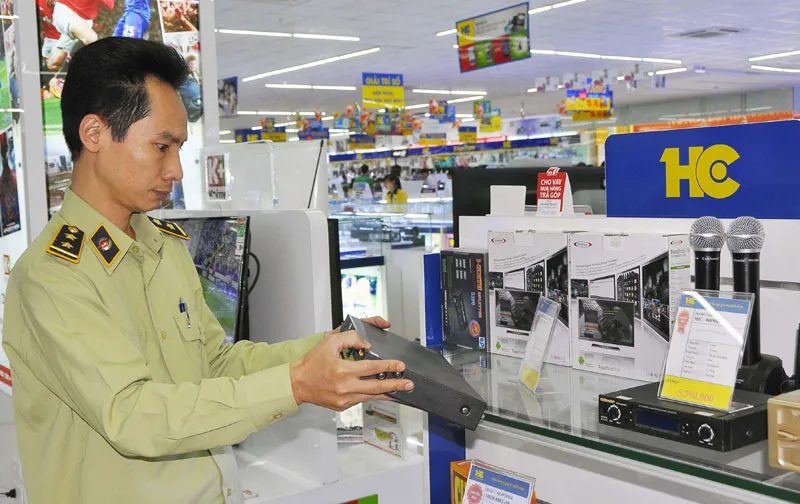Vietnam urged to step up fight against origin frauds
Foreign companies are abusing preferential treatments from free trade agreements (FTAs) between Vietnam and its partners for illegal transshipment.
Amid a growing number of Chinese goods forging Vietnamese origin to evade US punitive taxes when being exported to the US, Vietnam could face sanctions from the later without drastic measures to address the issue, according to experts.
| Hanoi's Market Surveillance Authority checked origin of products at HC super market. Photo: Le Nam. |
Last week, the General Department of Vietnam Customs (GDVC) identified a local company that imported Chinese silk but then changed the origin as Vietnamese products to export to India. By being labeled as of Vietnamese origin, those products would only be subject to an import tariff of 5%, instead of 25% as Chinese products.
Head of USAID Trade Facilitation Program Claudio Dordi said the issue is not new as the agency has found many Chinese products, ranging of bicycles, footwear, lighters, among others with counterfeit origin as Vietnamese goods to export to the US or the EU since 2000.
A report from the Vietnamese customs authority revealed it has caught 76 cases of origin frauds since 2019 to date, in which the majority were Chinese goods that underwent basic assembling process in Vietnam. After having acquired the certificate of Vietnamese origin, they are later exported to other countries such as the US, EU or Japan, among others.
Director of GDVC’s Customs Control and Supervision Department Au Anh Tuan said foreign companies are abusing preferential treatments from free trade agreements (FTAs) between Vietnam and its partners for illegal transshipment.
Recently, as the US has raised import tariffs to Chinese goods and products by an additional 7.5 – 285%, more and more goods have forged Vietnamese origin to evade US tariffs, Tuan added.
Lack of proper measures
Facing risks from foreign goods using Vietnamese origin for unfair trade gains, Prime Minister Nguyen Xuan Phuc on July 4, 2019 issued Decision No.824 aiming to improve state management to prevent evasion of trade remedies and origin fraud.
However, many experts raised concern that Vietnam’s legal framework has not had proper regulations and laws to address this issue.
Vu Tien Loc, chairman of the Vietnam Chamber of Commerce and Industry (VCCI), said the current Penal Code does not include punishments against the act of forging origin, while the concept of “illegal transshipment” has not been mentioned in any law.
Sharing the same view, Head of Hanoi’s Department of Market Surveillance Chu Xuan Kien said the law does not provide a detail clarification of “basic assembling works”, making it difficult for local authorities to identify whether a local firm is actually just assembling products for its foreign partners.
Loc from VCCI suggested local authorities should not tighten rules related to the issuance of certificate of origin, especially products having two thirds of production process outside Vietnam.













